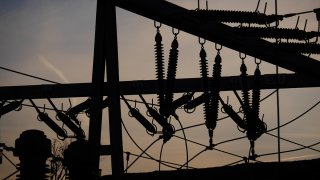
The region's electrical grid saw the greatest level of demand so far this year on Wednesday evening, but energy analysts said it is "likely" that the grid will top out at an even higher peak demand Thursday as hot and humid weather persists.
There is a chance for demand on the New England power grid to climb to about 23.5 gigawatts between 5 p.m. and 6 p.m. Thursday, the Metropolitan Area Planning Council said in an alert telling municipalities to reduce their consumption Thursday afternoon and evening to save money on their electric bills.
The organization, which runs a peak demand notification program in the summer months based on forecasts from grid operator ISO-New England, said yesterday's demand of about 22.4 GW is the current year-to-date peak.
ISO-NE said Wednesday evening that it had "issued a precautionary alert due to tight operating conditions over the evening peak" but stressed that the situation "is not a system emergency."
Get Boston local news, weather forecasts, lifestyle and entertainment stories to your inbox. Sign up for NBC Boston’s newsletters.
The organization reported Thursday morning that it projects demand could peak at 23.5 GW sometime in the 5 p.m. hour Thursday and that the grid is expected to have the capacity available to deliver 26.588 GW of power.
Electricity demand in New England is highest in the summer when residents and businesses turn to air conditioning to beat the heat and humidity. The grid's peak demand hour typically occurs during the late afternoon or evening in the hot summer months when air conditioning adds to the electrical load of businesses and homes.
But as more homes are heated with electricity, utilities expect that the grid will shift in the 2030s to hit its peak demand on winter mornings.
Local
In-depth news coverage of the Greater Boston Area.
During peak demand periods, dirtier fuels like oil are pressed into service so reducing demand during those times can have a greater impact on emissions displacement by limiting the use of high-emitting power generators, MAPC said.
Municipalities can also save money by reducing their electrical load when peak demand periods are in the forecast. The all-time record for peak demand in New England was set on Aug. 2, 2006, when demand reached 28.13 GW after a prolonged heat wave, ISO-NE said.



